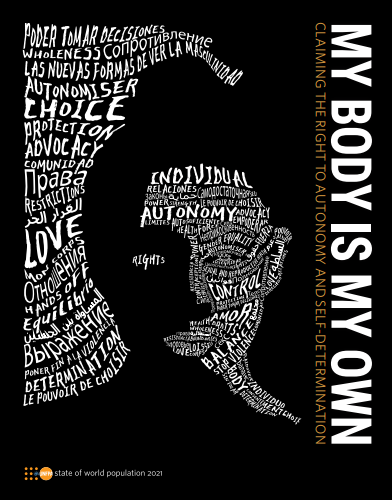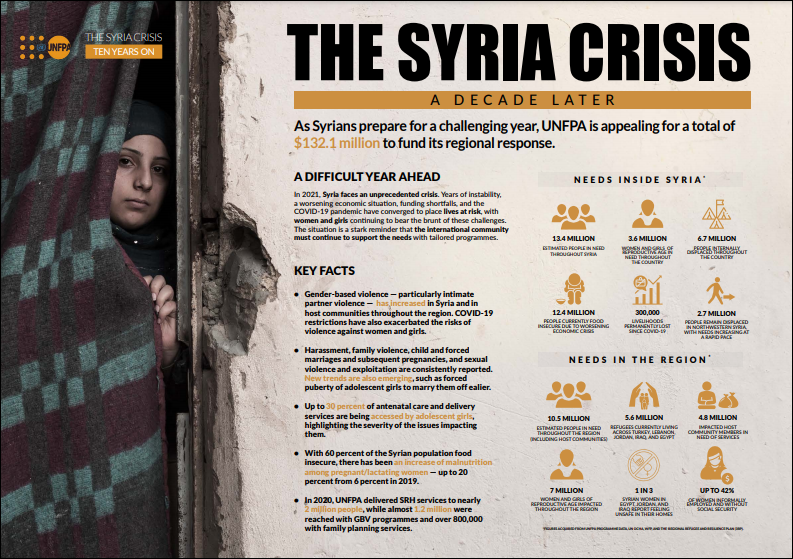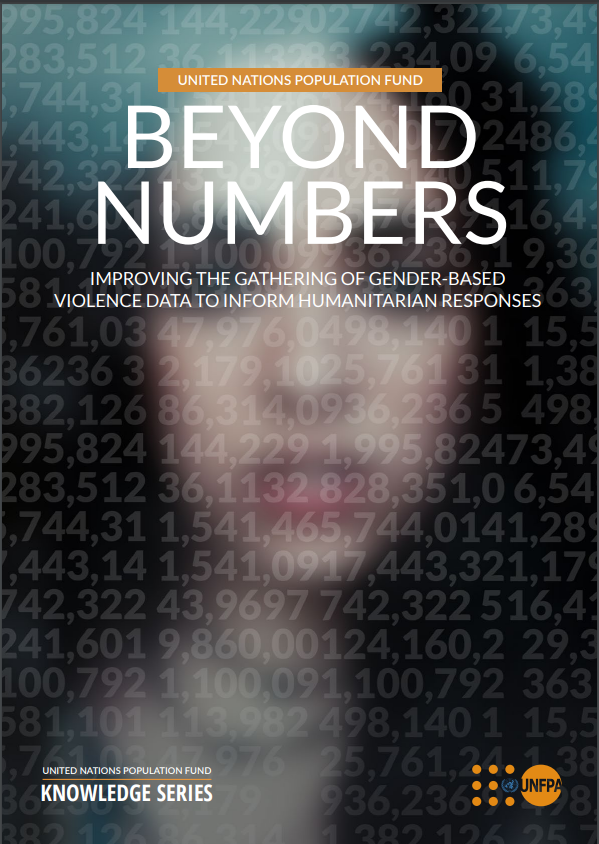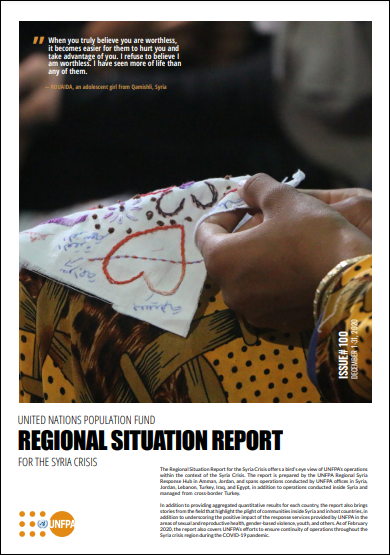You are here
New Releases

MY BODY IS MY OWN
Bodily autonomy means having the power and agency to make choices over our bodies and futures, without violence or coercion. This includes when, whether or with whom to have sex. It includes when, whether or with whom you want to become pregnant. It means the freedom to go to a doctor whenever you need one.
Yet women and girls—and indeed, all people—face constraints on their bodily autonomy. The consequences to their health, well-being and potential in life can be devastating. Intertwined with bodily autonomy is the right to bodily integrity, where people can live free from physical acts to which they do not consent.

My Body is My Own - Claiming the right to autonomy and self-determination
We have the inherent right to choose what we do with our body, to ensure its protection and care, to pursue its expression. The quality of our lives depends on it. In fact, our lives themselves depend on it.
The right to the autonomy of our bodies means that we have the power and agency to make choices, without fear of violence or having someone else decide for us. It means being able to decide whether, when or with whom to have sex. It means making your own decisions about when or whether you want to become pregnant. It means the freedom to go to a doctor whenever you need one.

Syria Crisis: 10 Years On Fact Sheet
In 2021, Syria faces an unprecedented crisis. Years of instability, a worsening economic situation, funding shortfalls, and the COVID-19 pandemic have converged to place lives at risk, with women and girls continuing to bear the brunt of these challenges. The situation is a stark reminder that the international community must continue to support the needs with tailored programmes.
This fact sheet provides an overview of the crisis 10 years on and the escalating needs on the ground, both inside Syria and throughout the region. The fact sheet also provides information on UNFPA’s priorities and funding requirements for 2021.

Women at the Centre: Joint cash-based assistance for women’s food security, nutrition, health and protection in Syria
Women at the Centre: Joint cash-based assistance for women’s food security, nutrition, health and protection in Syria

OVERVIEW OF FUNDING NEEDS UNFPA REGIONAL SYRIA CRISIS RESPONSE - 21
Ten years on, the crisis in Syria is worse than it has been in years. Protracted instability and disruptions in community networks, a worsening economic crisis, and the COVID-19 pandemic have converged to create an unprecedented situation, further placing the lives, dignity, and fundamental freedoms of Syrians at risk. An estimated 13.4 million people remain in humanitarian need inside Syria, including 3.6 million women and girls of reproductive age, while more than 11.7 million people — half of the Syrian population — remains internally displaced or are living as refugees in host communities throughout the region.
Women and girls continue to suffer the worst impacts of the crisis. It is estimated that — among those in need — close to 7 million are women and girls of reproductive age and close to half a million are pregnant, requiring access to quality sexual and reproductive health (SRH) services. Meanwhile, gender-based violence continues to be a daily threat, with harassment, family violence, child and forced marriage, and sexual exploitation remaining consistent trends. With COVID-19 taking hold throughout the country and in refugee communities region-wide, these challenges have only worsened, be it due to further restrictions on movement and access to services, or due to negative coping mechanisms and harmful practices as communities struggle to meet their basic needs

UNFPA Regional Situation Report for the Syria Crisis - January 2021
UNFPA Regional Situation Report for the Syria Crisis - January 2021

Beyond Numbers: Improving the Gathering of Gender-Based Violence Data to Inform Humanitarian Responses
This Knowledge Series guide provides a roadmap for producing in-depth gender-based violence analyses to inform humanitarian responses.
It is widely acknowledged that prevalence data is not necessary for establishing effective gender-based violence responses. As such, this guide aims to inform gender-based violence (GBV) responders, GBV coordinators, and humanitarian actors on how to collect GBV data safely to inform humanitarian responses, especially in contexts where available information on GBV is limited.
The content of this guide is based on the experience of the Whole of Syria GBV Area of Responsibility (AoR) which, over the six years prior to the publication of this guide, has annually produced one of the most positively-reviewed and evaluated in-depth analyses of gender-based violence in a humanitarian context, called Voices from Syria. The guide covers the essential steps taken to gather GBV data - from conducting assessments, analysing data and producing the report. Included in the guide is an in-depth description of the methodology that can be used to collect qualitative data, the reasons for adopting said methodology, and a detailed description of the key role that a publication like Voices from Syria can serve in informing programme design and advocacy. Challenges and lessons learned throughout the process have also been shared to help inform any replication of the methodology. Lastly, a section for COVID-19 has been added at the end of the guidance to provide recommendations on how to adapt data collection in light of the various restrictions and considerations brought about by the pandemic.
The guide is for gender-based violence coordinators or specialists who need to gather information on gender-based violence, particularly through the use of qualitative data. The data gathered can be fed into humanitarian needs overviews (HNOs), which in turn can inform the whole humanitarian response, be it protracted or acute. Most importantly, this guide can help in the development of products that serve to amplify the voices of women and girls and ensure that these voices directly inform the programmes that are designed to serve them.


OVERVIEW OF GENDER-BASED VIOLENCE IN SYRIA - Advocacy brief 2021
In 2020, the conflict in Syria has entered its tenth year. With more than half of Syria's population forced to seek asylum outside the country or be displaced within the country, women and girls faced a steady increase in the risks and forms of gender-based violence that affect them. The ongoing conflict, the deteriorating economic situation and the effects of the outbreak of the Covid-19 pandemic and the accompanying measures, such as movement restrictions and access to services, have made 2020 a difficult year, especially for women and girls.
Lockdown measures and lack of employment opportunities have been associated with a spike in incidents of intimate partner and family violence against women and adolescent girls. Physical, emotional, and sexual violence, sexual exploitation and abuse, early and forced marriage, and denial of education and economic resources are all prevalent forms of GBV that girls and women in Syria continue to face.

UNFPA Regional Situation Report for the Syria Crisis — December 2020
The Regional Situation Report for the Syria Crisis offers a bird’s eye view of UNFPA operations within the context of the Syria crisis. The report is prepared by the UNFPA Regional Syria Response Hub in Amman, Jordan, and spans operations conducted by UNFPA offices in Syria, Jordan, Lebanon, Turkey, Iraq, and Egypt, in addition to operations conducted inside Syria and managed from cross-border Turkey.
By the end of 2020, the Syria crisis region continued to face a multitude of challenges, particularly in light of the recurrent waves of COVID-19 infections that surged worldwide during the winter season. A decade into this protracted crisis, the situation remains critical as the people in need continue to endure the cumulative effects of years of instability, now further exacerbated by the burgeoning impacts of an unrelenting pandemic and a far-reaching economic crisis.
Even in these circumstances, UNFPA remains committed to providing essential services in sexual and reproductive health and gender-based violence, and to reaching the Three Zeros of zero preventable maternal deaths, zero unmet need for family planning, and zero GBV and harmful practices. The UNFPA Regional Syria Response Hub has been closely coordinating with country offices in the region to ensure that response plans and priorities are clearly established.